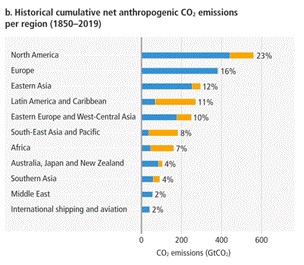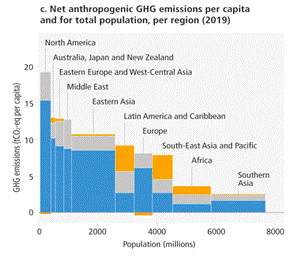Ministry of Environment, Forest and Climate Change
IPCC report on Mitigation of Climate Change scientifically establishes India’s position on the historical responsibility of developed countries for consuming the carbon budget
Report underlines the need for deep and urgent global emissions reduction and justifies India’s emphasis on equity at all scales in climate action and sustainable development, we welcome it: Shri Bhupender Yadav
Report an endorsement of India’s position on the need for scale, scope and speed in climate finance
Four-fifths of the total carbon budget for 1.5 deg C temperature increase and two-thirds of the total carbon budget for 2 deg C warming has been already consumed
Posted On:
05 APR 2022 3:24PM by PIB Delhi
Welcoming the Summary of Policymakers (SPM) and the Working Group III (WG3) contribution to the Sixth Assessment Report (AR6) of the Intergovernmental Panel on Climate Change (IPCC) released on 4th April 2022, Minister for Environment, Forest and Climate Change, Shri Bhupender Yadav said in his tweet message that the historical responsibility of developed countries for consuming the carbon budget is scientifically established by the report, and called for the need of taking deep and urgent global emissions reduction.
The Report dealing with climate change mitigation and international cooperation is a major contribution of IPCC to the global fight against climate change.
Stating further, Shri Yadav said that the report fully supports India’s view on the necessity of public finance for developing countries and the need for scale, scope and speed in climate finance.
The report specifically notes: “Tracked financial flows fall short of the levels needed to achieve mitigation goals across all sectors and regions. The challenge of closing gaps is largest in developing countries as a whole.” It also states that public finance falls short of the Copenhagen (reiterated when the Paris Agreement was signed) goal of USD 100 billion per year by 2020.
On climate finance, the report states: “Accelerated financial support for developing countries from developed countries and other sources is a critical enabler to enhance mitigation action and address inequities in access to finance, including its costs, terms and conditions and economic vulnerability to climate change for developing countries.”
Among other important things the Report has underlined the need for deep and urgent global emissions reduction mentioning that four-fifths of the total carbon budget for 1.5 deg C temperature increase and two-thirds of the total carbon budget for 2 deg C warming has been already consumed.
Both cumulative and per capita annual emissions rose during the pre-2020 period. Pre-2020 emissions reduction in developed countries has been insufficient in comparison to the developing world’s needs for sustainable development. Both historical cumulative emissions and per capita annual emissions show that India’s role (as part of South Asia) is minimal.
The historical responsibility of developed countries for consuming the carbon budget is scientifically established by the SPM which has included following two figures to emphasize this point.



The report justifies India’s emphasis on equity at all scales in climate action and sustainable development. Equity is essential for
- The social and economic transformation required for climate mitigation,
- Manage the negative consequences of climate mitigation on vulnerable populations,
- Enable just transition towards low-emissions development,
- And ensure sustainable development.
India’s position that equity is fundamental to international co-operation on climate change is endorsed by the report. Report says: “Equity remains a central element in the UN climate regime, notwithstanding shifts in differentiation between states over time and challenges in assessing fair shares”.
This finding is based on the Report’s assessment that with a shrinking remaining carbon budget, the access to a fair share of this budget for developing countries has become an important question.
The report embodies that changes in lifestyle and behaviours have a significant role to play in mitigating climate change. The Report endorses India’s view on the need for curbing unsustainable consumption.
It may be recalled that India was instrumental in ensuring the inclusion of “climate justice” and “sustainable lifestyles and sustainable patterns of consumption and production” in the preamble of the Paris Agreement.
Further, at COP26 in November 2021 at Glasgow, United Kingdom, as the implementation of the Paris Agreement began, India reaffirmed its commitment to climate actions, including the goal of net zero by 2070. Sustainable lifestyles underpin the survival of our planet. India believes that utilization of resources must be based on ‘Mindful and Deliberate Utilization’ and NOT ‘Mindless and Destructive Consumption’. Prime Minister, Shri Narendra Modi gave a clarion call of L.I.F.E. - Lifestyles for Environment at COP26 at Glasgow.
India firmly believes that climate change is a global collective action problem that can be solved only through international cooperation and multilateralism.
India has taken tremendous actions under the visionary leadership of Prime Minister Shri Narendra Modi to address the threat of global climate change by taking several initiatives including, inter-alia, setting up of International Solar Alliance, Coalition for Disaster Resilient Infrastructure, ‘One Sun, One World, One Grid’ and Infrastructure for Resilient Island States, raising the domestic renewable energy target to 500 GW by 2030, putting in place an ambitious National Hydrogen Mission and continuing efforts to decouple its emissions from economic growth.
India will continue to be the voice of ambition as well as the champion of equity on behalf of developing countries. India demonstrates this in specific, targeted actions, in specific suggestions and proposals and a firm faith in both science and human values.
India walks the talk and speaks from a position of strength and responsibility on the subject of climate change. It is from this experience that India sends a message of hope and optimism that humanity and all nations can strive together and meet the challenge of climate change.
***
BY/IG
(Release ID: 1813642)
Visitor Counter : 2926